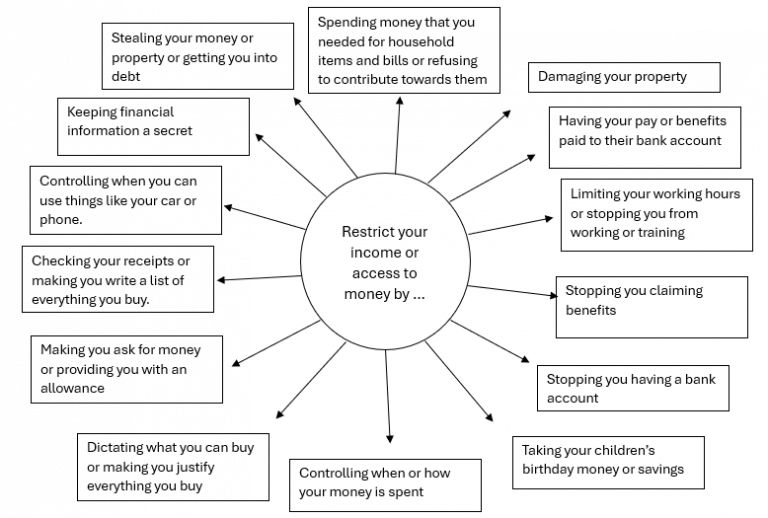Financial abuse is a form of domestic abuse. It is a legally recognised form of abuse and is defined in the Domestic Abuse Act 2021. Financial abuse usually happens when one person takes some kind of control over another person's money and finances, or over things that are accessed through money like food, activities, rent or travel. It can also include them having control over the other person's work. The person who is being abusive will usually be a partner or an ex-partner, but abuse can be between any two people who are or have been in an intimate relationship, have parented a child or are relatives. Financial abuse can happen on its own, but it is often one of many ways in which someone may try to abuse or control the other person.
Spotting the signs of financial abuse.

What effect does financial abuse have?
This type of abuse makes one person economically dependent on the other person and/or creates financial instability. It often makes it very difficult to leave the abuser. It can make it easier for the abuser to control the other person in lots of other ways as well, because they are dependent on them and have little choice.
It can affect the person's mental health, emotional wellbeing, and their physical and sexual safety.
It can also have long-term effects even after they have left the relationship: with poor credit ratings, debt and no savings to help them re-house themselves or buy essentials.
Getting support for financial abuse.
There are lots of people and organisations who can help.
If you are in immediate danger, you should call 999.
If you are not in immediate danger, there are charities and support organisations who offer domestic abuse support in lots of different ways. This could be a helpline for someone to talk to, advice on getting out of your relationship safely, places of safety that you and your children can move to – even if you have no money or access to any money -, advice on what you can do to help sort out your finances and re-build your life, courses so you can learn more about abuse and more.
Our experienced, approachable family solicitors can give you legal advice so you understand your options. We can also represent you in:
- Talking to and negotiating with your ex-partner about your separation, finances or children;
- Talking to your ex-partner about staying away from you, or limiting how you communicate, to keep you and your children safe;
- Applying to court for a Non-Molestation or Occupation Order – which are types of restraining orders that can protect you and your children;
- Applying to court for divorce or financial orders including orders about what happens to your money, assets like your house and debts.
- Applying to court for orders about your arrangements for the children including things like applying for a court order to secure the children living with you, deciding if and when they will see their other parent if that is safe, deciding how they will see their other parent if that is safe, moving school or to a new area.
The content of this article is intended to provide a general guide to the subject matter. Specialist advice should be sought about your specific circumstances.


